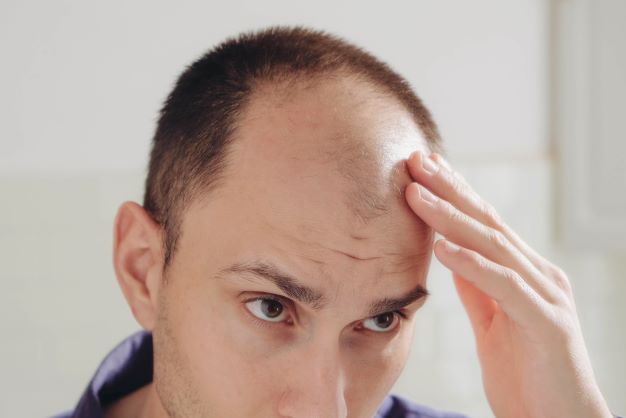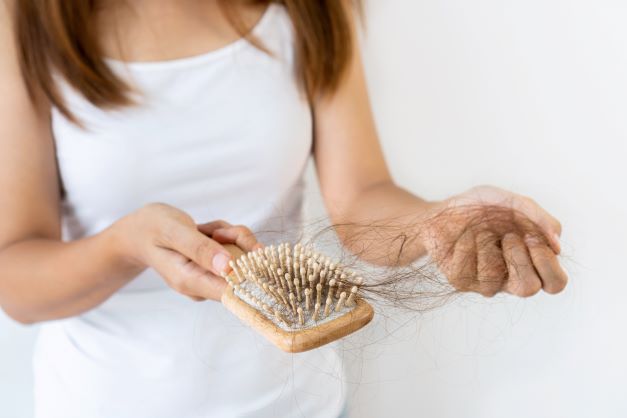There are a number of approaches to prevent or treat hair loss, and many of them are free of side effects and inexpensive or free of charge. Before you buy any lotions, potions, or pills, be sure to research which hair loss treatments are most effective.
Your doctor may recommend any number of treatment options for hair loss, depending on your situation. Here, we discuss the most well-known options that may be suitable for you.
What Do Dermatologists Prescribe For Hair Loss?
Finasteride
Men with moderate to severe hair loss often take finasteride, a medication that is frequently prescribed. Those with a family history of hair thinning, especially if combined with other hair loss remedies, typically take finasteride. Dihydrotestosterone (DHT), a hormone produced as a result of testosterone conversion, is considered the primary cause of male hair loss.
While finasteride is usually limited to men, it is an excellent treatment for women as well. This drug is not intended to regrowth hair; rather, it may help improve hair quality and decrease loss. It is also critical to understand that finasteride may have some pretty serious adverse effects, including decreased libido, erectile dysfunction, and diminished desire.
Minoxidil
Minoxidil has been around since the late 1970s, and it’s one of the few hair loss remedies that have been scientifically evaluated. By increasing blood flow to your hair follicles and revitalising your scalp, it helps your hair grow in stronger. Because it has been authorised by the American Food and Drug Administration (FDA) as the first and only hair loss treatment for both men and women, it is so successful.
Minoxidil is authorised to treat a variety of medical conditions, including heart disease and high blood pressure. Around 5% of patients experience side effects. It is available in several strengths, so finding the right dosage for your condition is simple. Itchy skin, rash, and irritability are among the most common side effects.
Nurafol
The all-natural ingredients in Nutrafol help strengthen hair by boosting cell growth and strengthening hair fibres. Vitamins B6 and iron are included in this hair loss treatment to boost hair strength. Saw palmetto, a plant extract that can reduce male hormones that cause hair thinning, is also included.
Nutrafol comes in tablet form so it’s simple to swallow or make into a drink. While Nutrafol is a powerful solution, it does not generate hair. Instead, it helps already existent hair grow longer and thicker so it is less visible when you lose some.
Spironolactone
Hair loss can be treated with spironolactone, a common drug, but it is important to remember that spironolactone is not authorised for use in men. Spironolactone is often administered in conjunction with other therapies in order to slow down hair loss and enhance the size of existing hair strands. It is a diuretic that reduces androgen amounts in the body.
Spironolactone reduces androgen production in androgenic alopecia, slowing down the progression of hair loss. Although it is effective, spironolactone may not result in hair regrowth for up to six months.

Laser Hair Therapy
Hair loss can be treated with laser therapy, a non-invasive procedure that employs light energy for hair regrowth. Laser hair therapy can be used in combination with other hair loss treatments like minoxidil and is usually applied to the scalp. Laser therapy does not regrow hair, but it may help stimulate it to appear thicker and tougher.
Laser hair therapy may take as long as six months to produce results, but it is a powerful treatment. There are several companies that make this product, so it is critical to do your research and pick one that has been approved by the FDA.
Other Ways to Deal with Hair Loss
Wash your hair carefully
Directing your hair forward rather than backward and brushing it toward your face minimizes follicle stress, preserving more hair. Shorter hair may also reduce pulling on the follicles and consequently decrease the amount of hair that is lost.
Having longer hair makes the hair itself heavier, which might result in pulling on the follicles. Your hair can be healthier if you avoid heat tools like blow dryers, maintain your hair clean, avoid harsh chemical substances, and maintain it healthy.
Treat other Health Problems
An iron or iodine deficiency, as well as hormonal imbalances or a low thyroid, can cause hair loss. Getting medical treatment for them can help expedite the repair process.
Whey, DHEA, testosterone, and human growth hormone all cause hair loss and thinning if taken in excess.
Apply oils to your hair
A mouse study conducted in 2014 reported that peppermint oil may help hair growth. In addition to its historical use as a hair growth promoter, rosemary oil has also been known to increase blood flow to the scalp. Rosemary leaf extract was found to improve hair regrowth in mice. Despite being heavily promoted, coconut oil, castor oil, and olive oil have little research to support hair growth.
Reducing your stress levels
It’s important to learn how to manage your tension in a way that preserves as much hair as possible, regardless of how hard you try to keep healthy.
Practising self-care and taking part in exercises like meditation and breath work may enhance your mental health and reduce your stress levels. Regular hair function may be aided by lowering long-term stress. It may be difficult to lower your stress levels in the current world or personal situations, but if self-care does not help, please seek the assistance of a therapist if one is available.
Eat healthily
Rather than cutting out key nutrients that are important for maintaining hair health, pay attention to what you’re eating and ensure you get the proper amount of nutrients. Make sure to consume a wide variety of fruits and veggies, whole grains, unsaturated fats, and lean protein. Remember to stick to your diet by restricting your consumption of sweets.
Final Points
There are treatments available to help reverse the effects of hair loss, and those who suffer from it can benefit greatly. Minoxidil and finasteride are two examples of drugs typically used together to prevent hair loss and stimulate regrowth. It’s easy to regrow your hair and maintain your self-confidence if you follow the correct regimen and adopt healthy hair habits.
A dermatologist who has earned board certification can help you determine why you are losing hair and offer the best treatment options. You may completely trust their recommendations, as they have also taken an extra exam to demonstrate their expertise.






















































